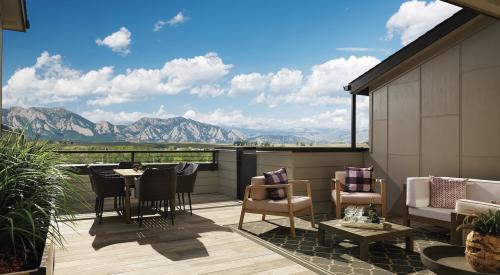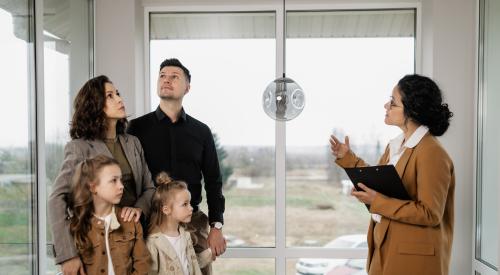How have minorities, teleworkers, and energy-efficient-conscious homebuyers responded to home buying in the midst of the pandemic? The National Association of Home Builders (NAHB) may have the answer.
In its annual What Home Buyers Really Want survey, NAHB asked more than 3,000 recent and prospective home buyers across the country about their preferences in home amenities. For NAHB, the COVID-19 pandemic was a big consideration when it came to surveying these participants in the summer of 2020. (View part 1 of our coverage of NAHB’s What Home Buyers Really Want report.)
Here are some of the key takeaways:
COVID’S IMPACT IN HOME BUYING
One big finding from the survey is that the majority of home buyers (67%) claimed that the pandemic has no significant impact on what they want in a home or community. Twenty-five percent of participants, on the other hand, have taken the crisis into consideration—while less than 10% were unsure at the time of the survey.
COVID-19 has been notorious for the increase of teleworking and virtual studying, and households with these types of people have been the most affected. Almost half (43%) of homes with at least one teleworker and one virtual student have said that their housing preferences have changed due to the pandemic. Most notably, they want bigger homes.
Thirty-five percent of buyers who work or study from home report that they are significantly more likely to want a larger home as a result of COVID-19, whereas homes with neither type of buyer have had minimal change in preference (10%).
Interestingly enough, 60% of respondents say they would prefer to purchase a newly-built home than one that had been previously lived in—the largest share since 2007. This could come from buyers’ concerns about the pandemic, a lack of existing homes on the market, or perhaps a higher likelihood that new homes are more significantly located where buyers want to buy: the suburbs.
THE COMMUNITIES DRIVING HOME BUYING
Since the arrival of the pandemic, nearly one-third (30%) of buyers prefer to purchase a home in an outlying suburb—the largest shift in location preference during this period.
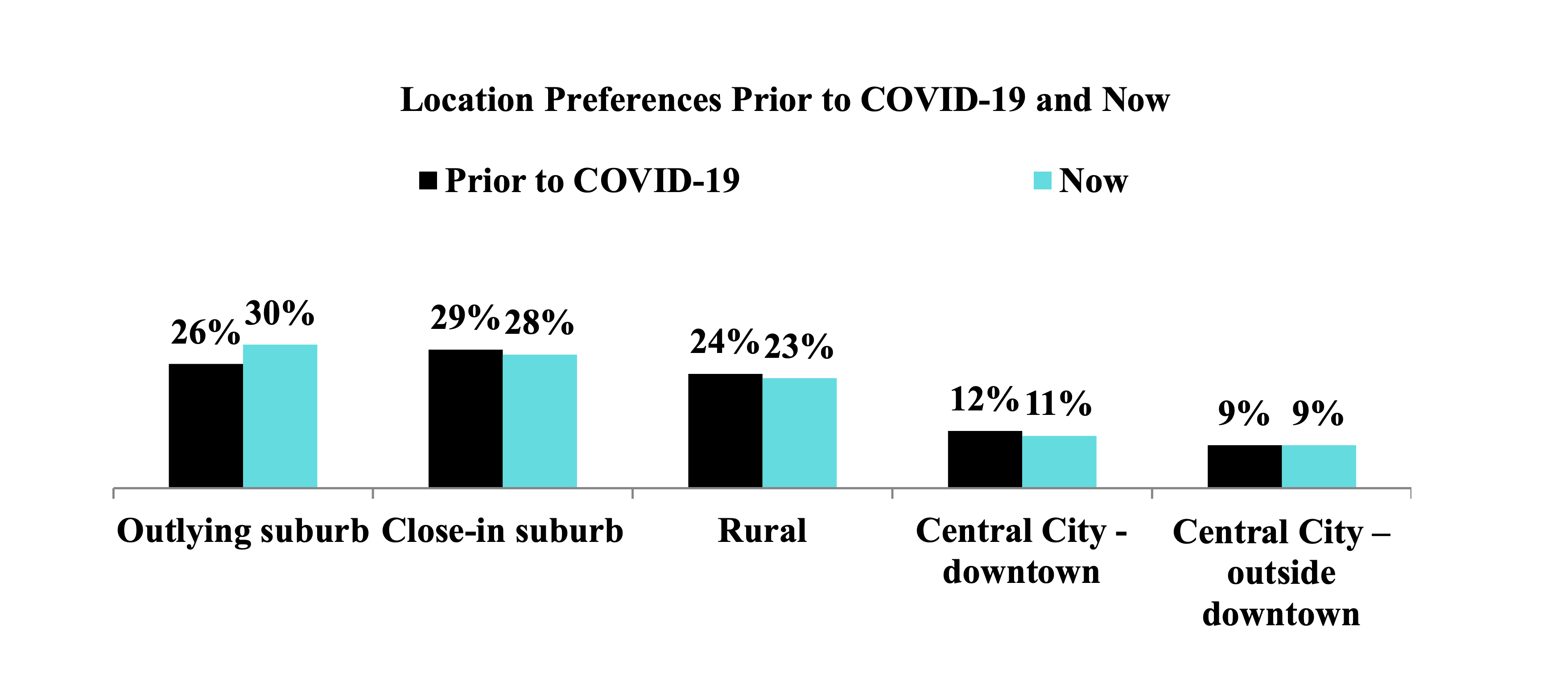
The Minority Buyer
One big demographic of those interested in suburban living are minorities. Asian-American home buyers have become significantly more favorable with moving to a suburb (71%), a jump in nine percentage points from the previous survey year. Among African-American home buyers, that difference is seven points; for Hispanics, the increase is six points. The share increased only by one point among Caucasian buyers in the past year.
Additionally, the survey asked participants about their preference in homes built to last for multiple generations. Though most buyers were evenly split (39% desired it, while 39% did not), this preference was more pronounced among the minority buyer. Over half (53%) of Hispanics, 50% of African-American, and 46% of Asians prefer multi-generational housing, compared to just 35% of Caucasians.
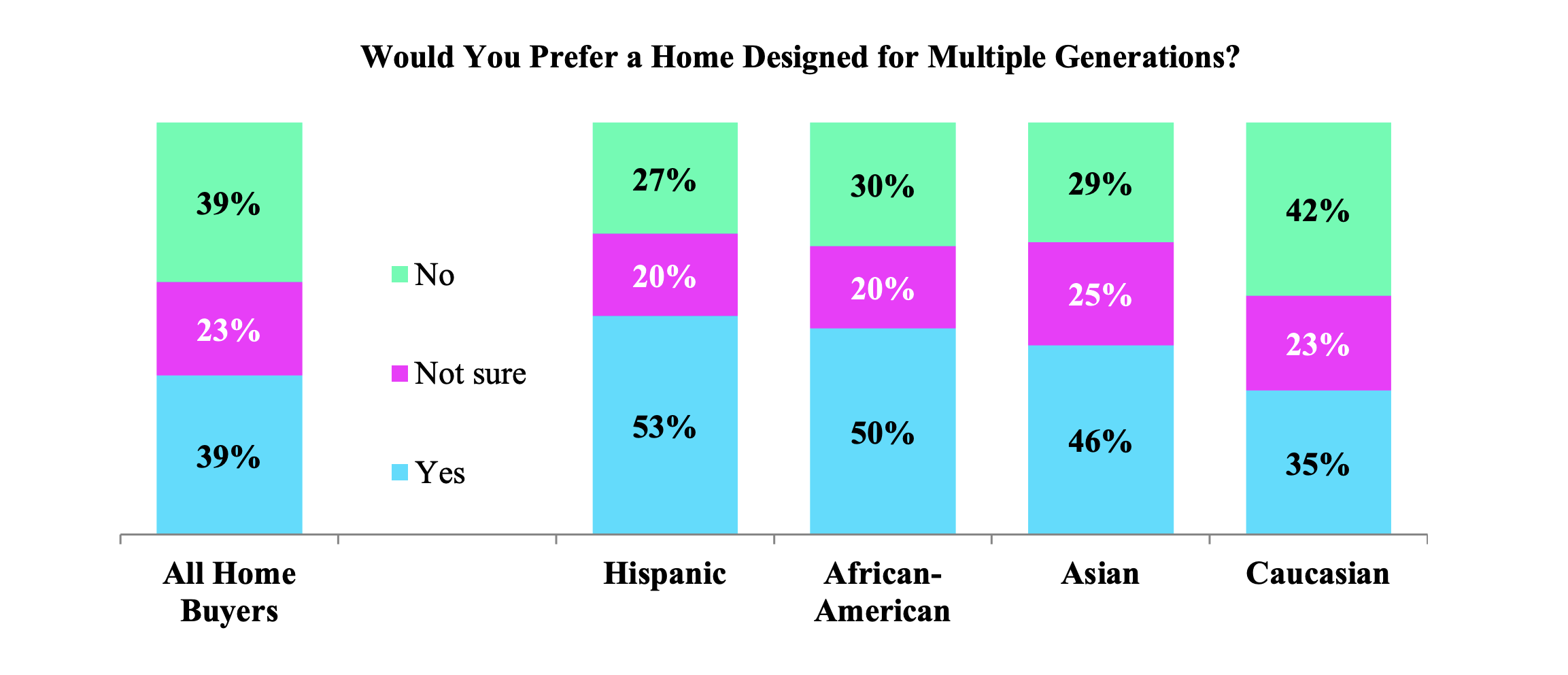
Home Design
Those numbers may be reflective in the design of homes as well. Almost half (46%) of buyers want three bedrooms, and not much more (32% wanted 4+ bedrooms in 2021, compared to the 40% that desired the same in a 2007 survey). However, married couples with children did in fact want at least four bedrooms (47%), whereas single-person households didn’t care much for it (13%).
The NAHB findings also show that there is not a majority opinion among buyers about the exterior design of their home. One-third (32%) prefer a traditional look, 24% desire something more contemporary, 16% enjoy transitional homes, and 14% want a modern design.
When it comes to the community surrounding the home, most buyers were open to the idea of living in an age-restricted (55+) community. Fifty-six percent of respondents claim they would consider buying one of these homes either presently or in the future, while 27% would not.
What most buyers want, regardless of age, is the presence of community.
Among the top five most requested community features include walking/jogging trails, a park area, a “typically suburban” neighborhood, location near retail space, and a walkable community ground.
ENVIRONMENTAL IMPACTS OF HOME BUYING IN 2021
A big consideration for most home building and buying in recent years is that of eco-friendliness.
Most buyers in 2021 (78%) are aware and concerned about how their home affects the environment, but only 15% of owners are willing to pay more for a home described as environmentally friendly.
When it comes to the power within their homes, more than half (52%) of buyers prefer heating and cooling through the use of electricity, while a third (33%) prefer using gas. The opposite is true for cooking: 39% use electricity while 51% prefer gas cooking. As for heating with water, the results are split, with 45% preferring gas heating and 40% electricity.
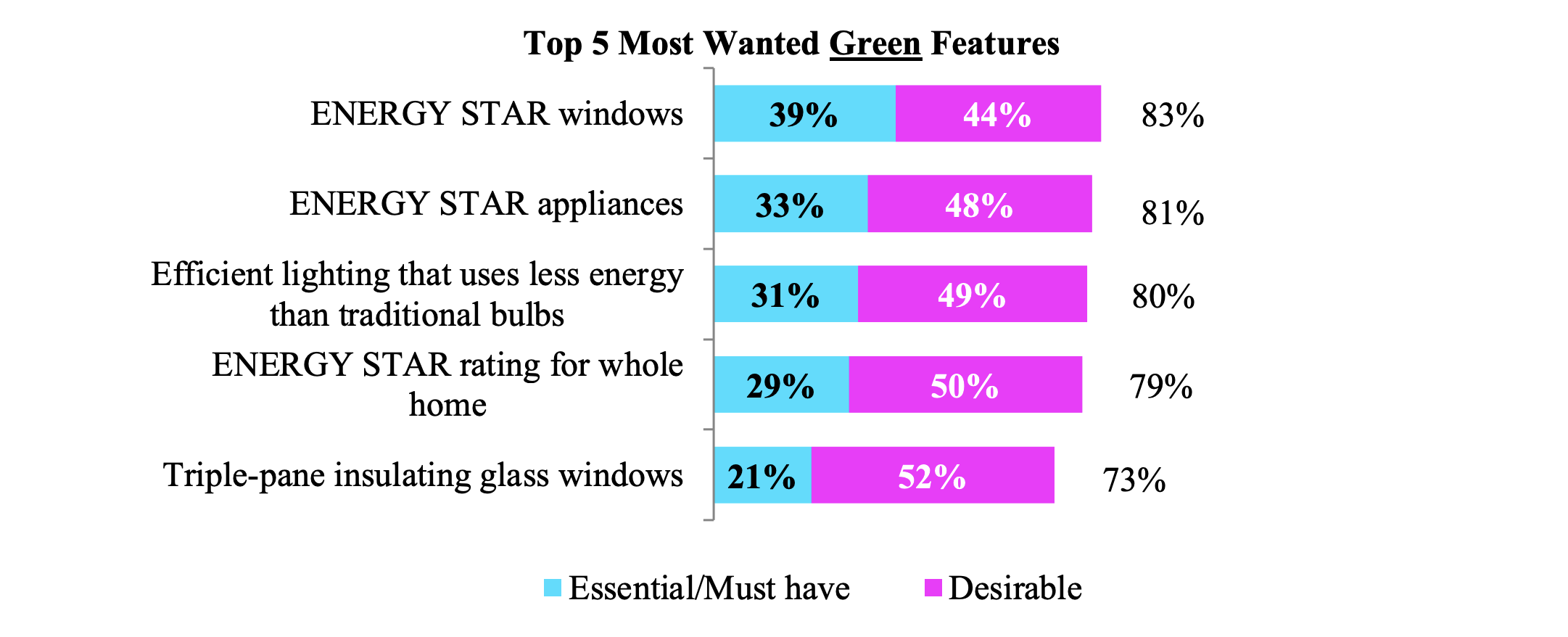
Additionally, the top five most requested technology features of 2021 either deal with energy efficiency or home security. A programmable thermostat, security cameras, video doorbell, and a multi-zone HVAC system are among the top of the list.
KEY TAKEAWAYS FROM THE NATIONAL ASSOCIATION OF HOME BUILDERS REPORT
This comprehensive survey shows how home buying preferences are more impactful than ever before. NAHB’s research indicates the recent sea of change in our daily lives, and how homes are evolving because of it. The “ideal home” means many different things for each individual, and this report could be the start of a wave of change to homebuilding in the coming years.
The complete 2021 study conducted by the National Association of Home Builders includes many more results not listed in the key findings, including an extensive appendix of the data, buyer types, participant demographics, and more.
For more on home amenity preferences found in NAHB’s survey, including Dahlin’s concept home, read our related article: Research Tracks the Pandemic’s Impact On the U.S. Home.
To download the PDF slidedeck from Ruthroff and Quint's IBSx presentation, “Home Trends, Buyer Preferences, and Must-Have Features for 2021,” click the DOWNLOAD THE REPORT button below.



